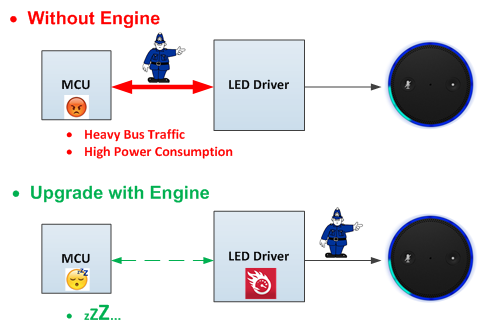SSZT894 November 2017 LP5569 , TLC5955
Products with good user experience can always receive positive feedback in the market. You can use audible, visual or tactile methods to improve the user experience for consumer electronics or smart home products like speakers, locks, smoke detectors and wearables. Visual is one of the most direct ways – and also one of the easiest – if you add a light-emitting diode (LED) ring. A good LED ring has various fancy effects, including smooth breathing, elegant chasing and rhythmic beating, Figure 1 illustrates an example of an LED Ring. It delivers a new soul to a product!
 Figure 1 LED Ring in Rotary Knob and Button
Figure 1 LED Ring in Rotary Knob and ButtonThe secret behind an LED ring is a very smart LED driver, which controls the current and pulse-width modulation (PWM) duty cycle of every red-green-blue (RGB) LED to achieve different colors and brightness levels. The PWM resolution of the LED driver is very important in order to achieve smooth color and brightness changes. Most LED drivers on the market offer 8-bit 256-step PWM control, which is not good enough to achieve an ultra-smooth effect, as the human eye can observe color and brightness jumps under low gray-scale conditions. TI’s TLC5955 48-channel LED driver resolves this problem; it has 16-bit 65,536-step resolution PWM control and 7-bit dot correction for every channel. An ultra-high 2% channel-to-channel current accuracy helps achieve perfect color and brightness consistency between different RGB LEDs.
To achieve sophisticated LED ring effects, the microcontroller (MCU) needs to refresh the LED driver’s internal registers continuously to control color and brightness. In some systems, the MCU is not strong enough to handle this. TI’s LP5569 is equipped with internal static random access memory (SRAM) for user-programmed sequences along with three programmable LED engines, which enables operation without processor control. Autonomous operation reduces system power consumption because you can put the processor into sleep mode, as shown in Figure 2.
 Figure 2 LED with Engine Control Help to Offload MCU
Figure 2 LED with Engine Control Help to Offload MCUWith more and more products integrating LED ring functionality, TI’s large RGB LED driver portfolio is expanding, adding new products to help you design systems more easily.
Additional Resources
- Check out the Status Indication reference design with LED and audio feedback.
- Learn about the Energy Harvesting and Fault indicator subsystem reference design.